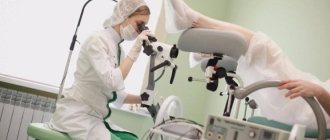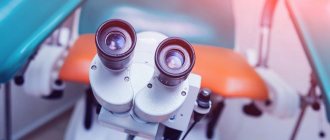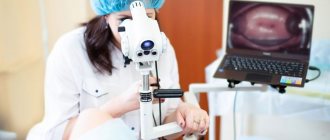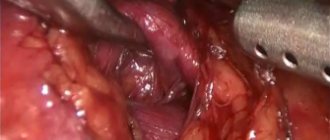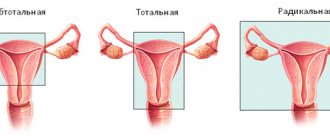Published 06/21/2019
Cervical cancer is the leading cause of death in women aged 30 to 35 years. At the same time, a woman often cannot detect the pathology on her own, experiencing minor complaints.
The cervix has a special anatomical structure. It is designed in such a way that the gynecologist can only see gross changes in the cervix, which, as a rule, are an indicator of an advanced process. A more detailed examination of the cervix for pathology is possible only under high magnification, which is precisely provided by a device called a colposcope.
What is colposcopy
This is a diagnostic method for examining the mucous membrane of the vulva, vagina and cervix using a special optical device - a colposcope. The procedure is a modern, painless and low-cost method for diagnosing the cervix. When identifying pathologies of the female reproductive system, colposcopy is sometimes indispensable.
Colposcopy allows you to identify malignant, precancerous and benign pathologies of the cervix. Moreover, during colposcopy, the gynecologist can additionally take a scraping for cytological analysis if suspicions arise during the examination or the woman is at risk for cancer.
Many girls who have cervical erosion without reminders turn to a gynecologist and undergo the necessary examination. Every girl should also take care of her health, even in the absence of pathology, at least once a year.
Colposcopy allows you to see minor changes in the cervix, even when at first glance it looks completely healthy. Staining with various dyes helps to identify those pathological changes that cannot be seen during a visual examination of the cervix by a doctor.
In what cases can a doctor prescribe a colposcopy?
There are the following indications for this procedure:
• itching in the vaginal area; • uncharacteristic discharge; • painful sensations during and after intimacy; • bleeding from the vagina.
If the smear analysis is not normal, the doctor may also advise the patient to have a colposcopy.
The purpose of the study is to:
• detailed examination of the vagina and cervical canal; • determination of precancerous and oncological diseases; • monitoring the effectiveness of treatment.
Features of colposcopy
This procedure is absolutely painless, reminiscent of an examination on a chair; minor unpleasant sensations may appear, which quickly pass.
The patient lies down on a gynecological chair, then the cervix is exposed using a gynecological speculum and a colposcope is brought to the required examination area at a distance of about 30 cm. It is a microscope that is connected to a screen. On the screen, the doctor sees the structural and anatomical parts of the cervix in high resolution. A high-quality enlarged image allows you to distinguish pathology from normality.
The procedure can be performed on any day of the menstrual cycle. The period of the study is individual and depends on the duration of the menstrual cycle, but in some cases, and on the recommendation of a doctor, it is recommended to undergo the procedure before the 10th day of the menstrual cycle. Colposcopy is not possible during menstruation.
Upon examination, the doctor will see whether the cervix is normal or changed. Some types of “erosion” are normal; they require regular examination and do not require “cauterization.” When pathological processes are detected, the gynecologist prescribes a biopsy or tests for bacterial and viral infections.
Contraindications

Despite the fact that the procedure is absolutely safe, it has certain contraindications.
- 8 weeks postpartum
- less than 1 month has passed since the abortion
- rehabilitation period after cryodestruction of the cervix
- rehabilitation period after surgery
A doctor's consultation is necessary to identify individual contraindications.
How to prepare for the procedure
For this procedure, there is no need to change your diet or take a special vacation or weekend. Those. no special preparation is required. The main thing is to carefully monitor vaginal hygiene and not use vaginal products 3-4 days before the procedure.
For two days before the start of the study, sexual intercourse is allowed only with a condom. The use of vaginal suppositories, tablets, antibacterial and antifungal drugs, and any topical medications is also not recommended. Avoid douching two days before visiting the doctor.
The procedure is not prescribed to girls without experience of sexual activity, with the exception of serious indications and visible deviations in an inpatient examination.
You should not be afraid of this examination, as it is completely painless and does not cause complications. On the contrary, just 15 minutes in the doctor's office can save your life. Cancerous changes in the early stages are sometimes impossible to distinguish from normal during a routine gynecological examination.
In addition to colposcopy, the doctor should prescribe a smear test.
Stages of cervical diagnosis

1. Preliminary consultation with a gynecologist
The specialist collects the patient’s medical history and clarifies the presence of past and chronic diseases. Consultation with a specialist is an important diagnostic step that should not be neglected.
2. Preparation for the procedure
In order for the diagnostic results to be as accurate as possible, the patient must follow a number of recommendations before the procedure:
- Stop douching 24 hours before.
- Do not use tampons or vaginal suppositories.
- Limit sexual intercourse 2-3 days before colposcopy (if you cannot limit it, be sure to use local contraceptives during sexual intercourse).
3. Computer colposcopy
Usually, simultaneously with the examination, the specialist takes a smear for laboratory analysis, and also conducts additional tests on the mucous membrane. For this purpose, special Cusco mirrors are used.
Is colposcopy performed on pregnant women?
Gynecologists advise carrying out this examination before conceiving a child. If indications for research are identified during pregnancy, this may mean that conception occurred against the background of a developing disease. Although this is not always confirmed.
This is a safe procedure if you follow the main rules of this examination during pregnancy:
- Do not carry it out in the early stages, as there is a high risk of spontaneous abortion;
- A biopsy is taken without fail if a malignant tumor is suspected;
- You should not be afraid of bloody discharge within 5 days after visiting the doctor, but it should be scanty and not cause severe pain.
Colposcopy during pregnancy not only detects cancerous and precancerous conditions, but also helps to monitor the course of the disease, since not all treatment methods are approved during pregnancy.
Within a few days after the procedure, the patient receives results. The attending physician prescribes vaginal suppositories and other medications that are allowed during pregnancy. For minor deviations, the doctor does not prescribe medications - only regular monitoring. After birth, a repeat examination is scheduled.
Indications and contraindications for colposcopy
An examination is prescribed by a doctor if there are specific complaints, questionable or negative test data, or visually observed abnormalities. Given its minimally invasive nature, it can be performed several times, including to assess the effectiveness of treatment.
Main indications:
- bloody issues
- erosion, dysplasia and other pathology of the cervix
- discomfort, pain, incl. during intimacy
- papillomas, condylomas, suspicion of neoplasms
The method is not used in the following cases:
- If the expected picture is blurred for some reason (menstruation, early postpartum period, surgical abortion)
- There is an allergic reaction to acetic acid, Lugol's solution used during the examination
- For inflammatory processes in the uterus, after diagnostic and therapeutic gynecological operations
- After ultrasound with a vaginal probe, smears and biopsy
Colposcopy during pregnancy, after sex and menstruation
Many people are interested in whether it is possible to conduct examinations during pregnancy. It all depends on why colposcopy is prescribed. If a woman has complaints, spotting, bleeding discharge, or visible tumors, an examination is carried out in any case.
A simple colposcopy is absolutely safe for the pregnant woman and the fetus. Extended, with chemicals, is used in cases where it is known exactly why it is carried out - to assess the extent of the tumor process, after injury, if examination is required for health reasons.
During your period
Colposcopy is usually not performed, since it is not possible to visualize the organ. Plus, during menstruation there is a high probability of infection of the uterus through the cervical canal. It can be carried out for health reasons. For example, after an injury.
After sex
In most cases, it is not carried out, since it will not be possible to obtain reliable data. During sexual intercourse, microtraumas of the vaginal mucosa are observed; the picture during examination may be blurry - it will be impossible to evaluate the vascular pattern, to understand where the consequences of microtraumas are and where the altered areas of the epithelium are. There may also be discomfort when treated with chemicals.
Lack of intimacy 2 days before the examination is one of the requirements for preparing for the examination. If there was intimacy, the patient should warn the doctor, since in this case many pathological processes at an early stage of development will be very difficult to identify. This is not the only requirement before the procedure.
Colposcopy: price and performance at Life-Medic
If you are interested in the cost of the procedure, you can find out how much a colposcopy costs in Moscow in the services section on our website. Our medical center is equipped with modern equipment and highly qualified medical personnel to provide impeccable medical care.
With us you can have a colposcopy at a time convenient for you. Call to find out when the ideal and bad dates for the procedure are and make an appointment for testing. You will be able to receive a conclusion immediately after the examination, and the doctor will prescribe the appropriate treatment.
Our cost for colposcopy is quite reasonable. Given the non-invasiveness and simplicity of the examination, women can undergo it without fear even during pregnancy.
Examination of the vagina does not cause any harm to the fetus. On the contrary, timely diagnosis of problems will help prevent deterioration of health and the threat of miscarriage.
Call if you have questions.
Sign up for an examination at our Life-Medic clinic. We will be happy to help you! MAKE AN APPOINTMENT
Recommendations after the procedure
After colposcopy, due to its low invasiveness, you do not need to change your daily life in any special way. There is no need to diet, take medications, or restrict physical activity. Only in the case where a biopsy was performed, you can save yourself for 5-7 days.
The doctor will recommend:
- do not douche, do not take a bath, do not use the sauna
- limit the use of vaginal medications and tampons
- give up physical activity - sports, hard work
Attention . Due to the fact that colposcopy can cause minor injuries, it is advisable to have a sanitary pad with you on the day of the examination.
Is it possible to have sex?
After a routine colposcopy, you should avoid intimacy for 1-2 days. Especially if there was spotting after the examination. If a biopsy was taken, then the period without sexual activity should be 5-7 days.
Will there be pain during or after the procedure?
Reviews about the procedure speak for themselves. 98% of women do not complain of pain during the examination. For others, pain may be associated with an active inflammatory process.
As the procedure progresses, discomfort associated with mechanical and chemical irritation of the genital organs is possible. A tingling or burning sensation appears after treatment with acetic acid or Lugol's solution.
Since microtraumas appear on the mucous membrane during examination, Candida fungi actively multiply in patients with reduced immunity, and thrush appears. This explains possible itching after the examination.

